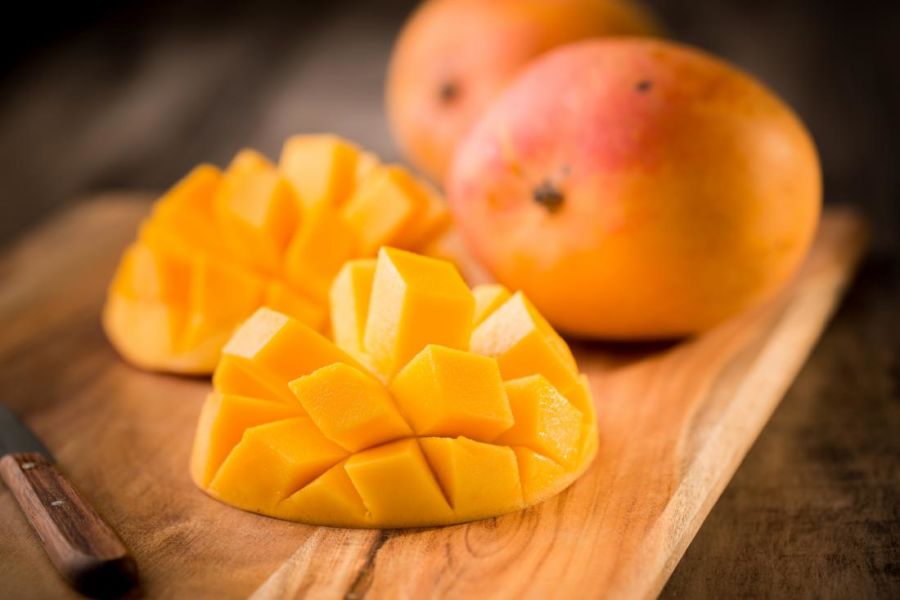Fruits are a healthy way to help curb your sugar cravings if you have diabetes. Not only this, you also get essential vitamins and minerals from fruits. Fruits contain a wide range of nutrients. However, they also contain carbohydrates and natural sugar. Plan your portion size carefully based on the number of carbohydrates and sugar in fruits. Glycemic index(GI) and Glycemic Load (GL) assist you in choosing the best diabetes-friendly fruits. People with diabetes can eat apples, oranges, papayas and mangoes.
Mango is a seasonal fruit that contains both carbohydrates and natural sugars. Mangoes contain antioxidants that fight free radicals in the body and prevent cellular damage. Mangoes are a rich source of potassium and magnesium that help lower blood pressure. Therefore, when eaten in moderation, mangoes can benefit people with diabetes.
Glycemic Index and Glycemic Load of Fruits
The glycemic index (GI) describes how quickly carbohydrates affect your blood sugar level. The GI of most whole fruits ranges from low to moderate. Consider fruits with a low glycemic index of 55 or below, as these are the fruits good for diabetes. Glycemic load measures carbohydrates in a serving of food and how quickly it raises blood glucose levels. Choose fruits with a glycemic load of 10 and below.
A fruit serving may be planned by considering both GI and GL of fruits for a diabetes-friendly diet.
Diabetes-Friendly Fruits
People living with diabetes can include the following fruits in their diets:
- Apples: Apples are very nutritious because they contain vitamin C, soluble fibre and other nutrients.
- Oranges: A medium orange consists of folate and potassium that assist in normalising blood pressure.
- Mangoes: Mangoes are wonderful fruits. Most people wait for the mango season to relish this delicious fruit. But is mango good for diabetes? Let’s read more about it.
Mango contains natural sugar, which contributes to a rise in blood sugar levels. But it also supplies ample fibre and antioxidants. Moderation is key. People with diabetes may enjoy this fruit, but they must be careful about the portion size and consume it in moderation.
- Papaya: Papaya is high in antioxidants and fibre, which help prevent cell damage in the body. The low-calorie fruit is rich in vitamin B, folate, and minerals like potassium, magnesium and fibre.
- Bananas: Bananas contain carbohydrates and sugar. They are also a good source of potassium, vitamin B6, fibre and vitamin C.
- Kiwis: Kiwis help control your blood sugar levels since they are rich in fibre and have a low glycemic index. Kiwis are definitely among the fruits that are best diabetes-friendly fruits.
Also read: 7 Reasons Why Soft Drink is The Most Harmful Thing for Your Health
Is Mango Good for Diabetes?

Mangoes contain a host of nutrients. However, they also have carbs and natural sugar, contributing to blood sugar levels. But, mangoes also have ample fiber and antioxidants. The glycemic index of mango is 51, which is considered low. Mangoes are highly nutritious and contain potassium and magnesium, which help lower blood pressure.
They are a great source of vitamins A, C, and K. Mangoes also help stabilize your digestive system. The fibre content in mangoes helps to prevent constipation. When consumed in moderation, mangoes can be beneficial for people with diabetes. One cup of fresh mango contains:
- Calories – 99
- Carbohydrates – 24.7 grams
- Protein – 1.4 grams
- Fibre – 2.6 grams
- Sugar – 22.5 grams
- Vitamin A – 10% of the Daily Value (DV)
- Vitamin C – 67% of the DV
- Vitamin B6 – 12% of the DV
- Folate – 18% of the DV
- Vitamin E – 10% of the DV
- Vitamin K – 6% of the DV
- Potassium – 6% of the DV
- Niacin – 7% of the DV
- Riboflavin – 5% of the DV
- Thiamine – 4% of the DV
- Magnesium – 4% of the DV
Benefits of Mangoes for People with Diabetes

1. Aid in diabetes management
Fibre present in mangoes assists in diabetes management. A fibre-rich diet can help control blood sugar levels by slowing sugar absorption.
2. Good substitute for sweets and chocolates
People who like to eat sweets can benefit from eating mangoes instead, as they are nutritious and contain antioxidants and vitamins. Mangoes can help you keep your sugar cravings at bay.
Different Ways to Consume Mangoes
You can add mangoes to your fruit salads and ice-creams. You can also grill mangoes and enjoy them as an evening snack. Always eat the whole fruit as the fibre content in it slows down digestion.
However, avoid consuming mangoes in the form of juice as the fibre content in this form is removed, and it instantly raises a person’s blood glucose levels. Studies claim that people who consume more fruit juice are likely to develop type 2 diabetes.
Fruits That People with Diabetes Should Avoid
- Watermelons
- Pineapples
- Ripe Bananas
Conclusion
People with diabetes can consume any low GI fruit. Fruits like oranges, apples, berries, plums and kiwis are high in fibre and good for diabetic patients. You can also consume mangoes in diabetes, but in moderation. Also, always try to consume whole fruits as they help maintain a stable blood sugar level. The vitamin and antioxidant content in mangoes may combat oxidative stress caused by high blood pressure, heart disease, and inflammation.
So, you may think, “Are mangos diabetes-friendly fruits?” The answer is yes. When consumed in moderation, mangoes can provide a host of benefits for people living with diabetes.
Also read: How Diabetes Can Be Treated Using Technology
























































